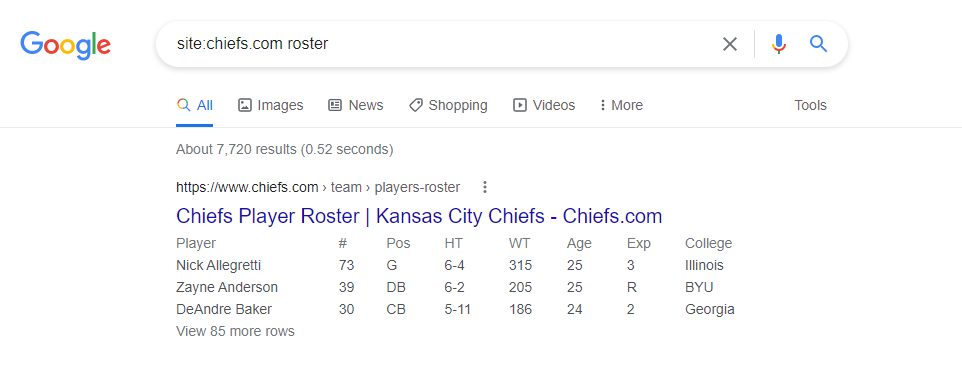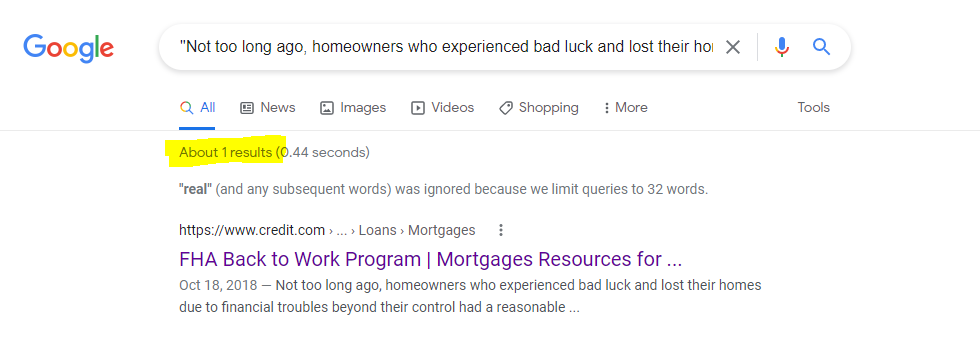Lesson 1.3: How to Search Like a Pro
Article by: Matt Polsky
The typical searcher goes directly to Google and inputs a handful of words to get their result. However, advanced search options, known as advanced search operators, can help users dial in a specific search.
What is an Advanced Search Operator?
An advanced search operator is a command or parameter that allows a searcher to narrow search results to a very defined set.
Advanced search operators are very useful for SEOs and help do things like:
- Determine if a site or page is indexed
- Find duplicate and overlapping content
- View data on the number of results indexed
- See how Google views a specific page
Each search engine has its own set of advanced search operators, so we'll focus on Google. If you're curious about Bing's search operators, you can view this list from Microsoft.
Google's Advanced Search Operators
Quotes ""
The quote operator forces Google to pull results exactly containing a specific search term.
Example: "search term here"

OR or Pipeline (|)
The OR operator (or pipeline) combines two searches into a single search.
Example: Patrick Mahomes OR Travis Kelce
AND
The AND operator returns results containing both X and Y instead of one or the other, like the OR operator.
Example: Patrick Mahomes AND Travis Kelce
Minus –
The minus operator removes words that can return in search results.
Example: -“Patrick Mahomes” Travis Kelce
This example returns results that mention Travis Kelce and do not mention Patrick Mahomes.

Wildcard *
The wildcard operator matches any missing word or phrase.
Example: Brett * chiefs GM

cache:
The cache: operator allows you to view Google's cached version of a page. Pro tip: click "Text-only version" if you're worried that Google can crawl your content.

site:
The site: operator is one of the most common and useful. With this, you can search everything within a specific domain, subdomain, folder or determine the top-level domain.
Example: site:chiefs.com

related:
The related: operator returns a site related to a given domain.
Example: related:chiefs.com
filetype: or ext:
The filetype: operator returns results with a specific file type, such as PDFs, DOCX, TXT, etc.
Example: site:chiefs.com filetype:pdf
intitle:
The intitle: operator returns results based on the title tag.
Example: intitle:chiefs

allintitle:
The allintitle: operator is essentially the same as intitle but all the keywords you search must be in the title.
Example: allintitle:Kansas City Chiefs Team
inurl:
The inurl: operator requires the words in your search to be in the URL.
Example: inurl:chiefs
allinurl:
The allinurl: operator requires all the words in your search to be in the URL.
Example: allinurl:chiefs mahomes trade

intext:
The intext: operator requires the results to include your search term in the page's text.
Example: intext:Patrick Mahomes
allintext:
The allintext: operator requires the results to include all of your search terms in the page's text.
Example: allintext: "Love is in the air. Sometimes an NFL team can fall hard for certain performers knowing full well they're unattainable."

Advanced Search Operator Examples
See if a Site Writes About Your Niche
Google roughly found and indexed around 34,400 results from Chiefs.com. As we'll learn later, this doesn't mean the entire site is 34,400 pages – Google may have ignored 100,000 pages or the site can also block Google from finding pages.

Only around three results mention badminton. If your niche was in badminton, your audience is likely not scouring Chiefs.com.

Find Sites in the Same Niche

Find Duplicate Content
Copying and pasting or duplicating content across pages and sites is bad for SEO. You can find possible content overlapping and duplicate content with a few simple searches.
Find Overlapping Topics:
site:credit.com fha loan eligibility

Find Duplicate Content:
It never hurts to double-check a freelancer's content to ensure it wasn't plagiarised. An easy way to do this is with a quick quotes search.
"Not too long ago, homeowners who experienced bad luck and lost their homes due to financial troubles beyond their control had a reasonable method to fast track their re-entry into the real estate market."

Find Sites an Author Wrote For
Sometimes, you may want to see how many sites an author has written for.
The search below looks for the term "mortgage," the name "Tim Lucas," and URLs that include "author" – since many sites have author archives under /author/.

Now that you have a baseline understanding of what SEO is, the types of organic results and how to do complex searches, our next lesson dives into the specifics of how search engines work.
